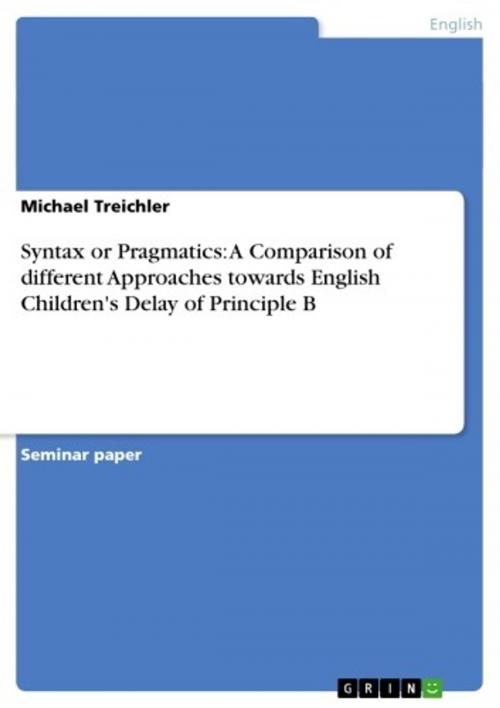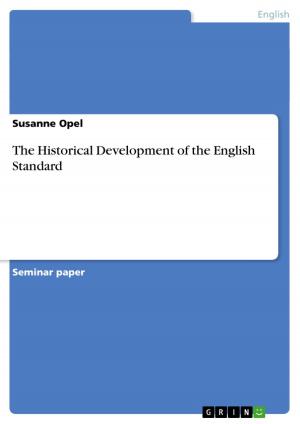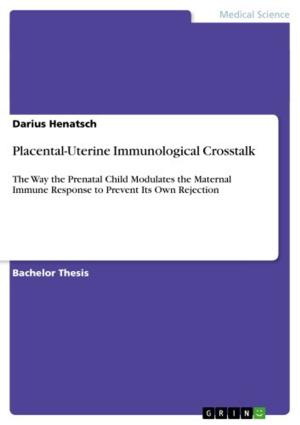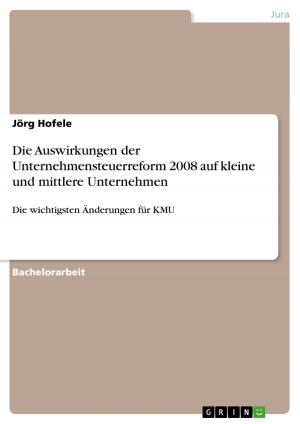Syntax or Pragmatics: A Comparison of different Approaches towards English Children's Delay of Principle B
Nonfiction, Entertainment, Drama, Anthologies| Author: | Michael Treichler | ISBN: | 9783638325424 |
| Publisher: | GRIN Publishing | Publication: | November 16, 2004 |
| Imprint: | GRIN Publishing | Language: | English |
| Author: | Michael Treichler |
| ISBN: | 9783638325424 |
| Publisher: | GRIN Publishing |
| Publication: | November 16, 2004 |
| Imprint: | GRIN Publishing |
| Language: | English |
Seminar paper from the year 2004 in the subject English Language and Literature Studies - Linguistics, grade: 1 (A), Carl von Ossietzky University of Oldenburg (Seminar for Anglistics), course: Hauptseminar 'Binding Theory', 7 entries in the bibliography, language: English, abstract: In their experiment carried out in order to test children's knowledge of the binding principles, Chien and Wexler (1990) observed that their subjects showed a considerable delay of the acquisition of Principle B compared with Principle A. While the children who participated in their study mastered the locality conditions of anaphors nearly perfectly by the age of six and even earlier, many of them still allowed pronouns to be coindexed with a local antecedent. In a similar study especially designed to examine children's knowledge of only Principles B and C, Grimshaw and Rosen (1990) also found that the non-locality constraint for pronouns was to a large extent violated. Like Chien and Wexler, Grimshaw and Rosen state that children yet have innate knowledge of Principle B. A distinction has to be made, they argue, between knowledge of Principle B, on the one hand, and obedience to it on the other. Although children know Principle B, other grammatical and pragmatic influences and circumstances prevent them from obeying it. Both theses have in common that they are based on the assumption that the delay of Principle B is a universal phenomenon that can be found throughout all languages. However, in a study carried out by McKee (1992), it turned out that the delay of Principle B only affected the group of English children while the Italian children showed nearly perfect mastery of both Principle A and B. McKee accompanies these results by her proposal for an explanation of English children's delay of Principle B. Since the experiment was carried out with Italian sentences containing clitic pronouns, her account is based on syntactical differences between this type of sentences and its English counterparts containing full pronouns. This paper will start with a presentation of McKee's thesis. The presentation will be followed by a discussion in which McKee's account will be compared with alternative explanations for the delay of Principle B. Since McKee's syntactically motivated model stand in contrast to other theses based on pragmatics, the final aim will be a judgment about the adequacy and plausibility of both types of approaches. This judgment will be supported by another thesis developed by Cardinaletti and Starke (1995) in which they seek to explain the delay of Principle B by an ambiguity of English pronouns comprising all parts of grammar.
Seminar paper from the year 2004 in the subject English Language and Literature Studies - Linguistics, grade: 1 (A), Carl von Ossietzky University of Oldenburg (Seminar for Anglistics), course: Hauptseminar 'Binding Theory', 7 entries in the bibliography, language: English, abstract: In their experiment carried out in order to test children's knowledge of the binding principles, Chien and Wexler (1990) observed that their subjects showed a considerable delay of the acquisition of Principle B compared with Principle A. While the children who participated in their study mastered the locality conditions of anaphors nearly perfectly by the age of six and even earlier, many of them still allowed pronouns to be coindexed with a local antecedent. In a similar study especially designed to examine children's knowledge of only Principles B and C, Grimshaw and Rosen (1990) also found that the non-locality constraint for pronouns was to a large extent violated. Like Chien and Wexler, Grimshaw and Rosen state that children yet have innate knowledge of Principle B. A distinction has to be made, they argue, between knowledge of Principle B, on the one hand, and obedience to it on the other. Although children know Principle B, other grammatical and pragmatic influences and circumstances prevent them from obeying it. Both theses have in common that they are based on the assumption that the delay of Principle B is a universal phenomenon that can be found throughout all languages. However, in a study carried out by McKee (1992), it turned out that the delay of Principle B only affected the group of English children while the Italian children showed nearly perfect mastery of both Principle A and B. McKee accompanies these results by her proposal for an explanation of English children's delay of Principle B. Since the experiment was carried out with Italian sentences containing clitic pronouns, her account is based on syntactical differences between this type of sentences and its English counterparts containing full pronouns. This paper will start with a presentation of McKee's thesis. The presentation will be followed by a discussion in which McKee's account will be compared with alternative explanations for the delay of Principle B. Since McKee's syntactically motivated model stand in contrast to other theses based on pragmatics, the final aim will be a judgment about the adequacy and plausibility of both types of approaches. This judgment will be supported by another thesis developed by Cardinaletti and Starke (1995) in which they seek to explain the delay of Principle B by an ambiguity of English pronouns comprising all parts of grammar.















